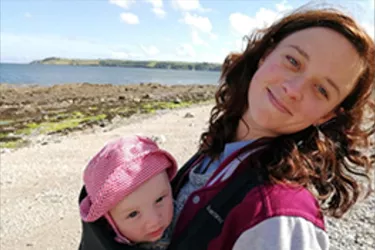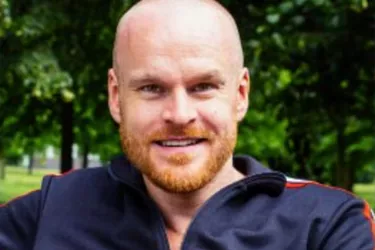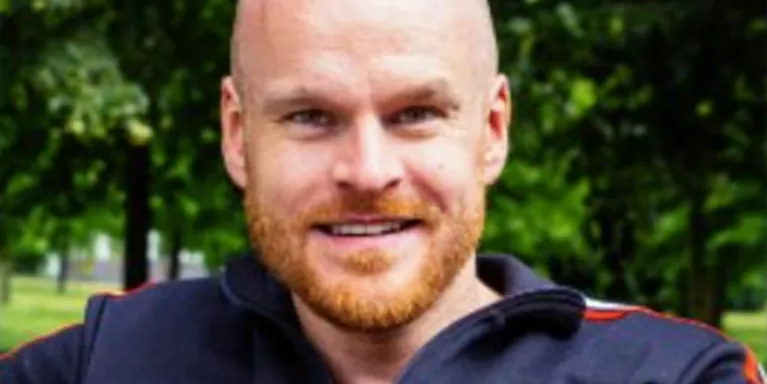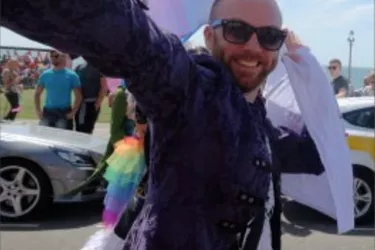How homophobia impacted my mental health
Ceri shares her story about her experience of pregnancy and how homophobia affected her mental health.
Ceri lives in Cardiff with her partner and son.
Everyone has mental health but as we know, not everyone has an easy time with it. LGBTIQ+ people are no strangers to mental health struggles. My journey as a lesbian certainly hasn’t been the smoothest. What I wasn’t prepared for was the effect that the homophobia I experienced during teenage years, would have on my pregnancy.
I was 32 and felt so lucky to be successful in my first round of IVF and thanks to UK law I was able to have my girlfriend’s egg fertilized with a not-for-profit sperm donor, and I could even carry the baby! It would have been hard for my teenage self to imagine this could happen for me, growing up in the 90’s when homophobia was the norm. I grew up in a time when queer people were viewed by many as immoral, weird and even disgusting. As a result I begun to hate myself. I was afraid of my own feelings for other girls. I was petrified of being ‘found out’.
"This was the beginning of my long battle with anxiety. And just like the absence of support for queer people back then, there wasn’t much awareness around mental health either."
As women we have to deal with a lot of hormonal changes throughout our lifetime, and pregnancy is one of the most major. Hormones are so powerful during pregnancy that they can alter the way in which the brain works. Not every pregnant woman will have problems with her mental health, but through a combination of growing up afraid of my same-sex attraction, combined with other difficult life events, my mental health took a turn for the worst.
My pregnancy turned into the hardest time of my life. I was in a constant state of agitation. I barely slept and my adrenaline was sky high. Racing, obsessive thoughts meant I couldn’t concentrate on anything. My whole body was consumed, and no amount of reassurance could make me calm.
"Reality began slipping away as a result of mental and physical exhaustion and my thoughts turned to despair."
My family referred me to the perinatal mental health team and I was put on anti-depressants that were safe during pregnancy. I was also offered therapy and home visits by healthcare professionals. However, things still went from bad to worse after the birth.
For a brief, beautiful moment, my misery was put on pause as our gorgeous son entered the world. The love I felt for him was instant. Our family was complete.
A few weeks went by and my family were working together to look after our newborn. As part of an on-going treatment plan I was put on stronger medication. But whilst our son was blossoming, I was losing my grip on reality and my mental health began to deteriorate again. My body would not relax, and my sleep continued to be very poor. That’s when my family brought me to the local psychiatric ward.
My first night at the psychiatric ward was bleak; I was trapped in my own mind, and felt like a prisoner, even though staff there were very caring. My medication was altered and I was seen by specialists, but nothing was helping. By the third night I couldn’t bear being there any longer and asked to come home. However it was when I was back home that I finally gave up hope.
This time someone from the psychiatric hospital brought me back there. I was given anti-depressants, sedatives, and anti-psychotics. As a last resort I received ECT (electroconvulsive therapy). The idea was that the ECT would create new pathways in my brain. And that’s just what it did - it gave me a new beginning.
Over the course of the next few weeks at the psychiatric unit I slept properly for the first time in about a year. I went from strength to strength with the tireless help of the perinatal mental health team. My friends and family rallied around me and my girlfriend regularly brought our son to visit.
By the time I left hospital, I was ready to start living again. Finally I knew my diagnosis-Agitated Depression. Whereas anxiety was a very broad term, agitated depression fitted my experiences precisely. Having that label helped me to understand my illness for the first time in my life. Now I had to find a way to stop that label defining me.
My son is now six months old and our family is going from strength to strength. After 13 rounds of ECT I am in a stronger place. I continue to receive help from the community mental health team, and will do so for the foreseeable future. I have a medical plan that is individually tailored, and includes the use of anti-psychotics.
It took 17 years to receive this diagnosis; agitated depression that grew from anxiety about my feelings as a teenager, feelings that were considered wrong by everyone around me. The effects of homophobia can leave long-lasting impressions.
"My message to others is to never give up on your mental health. It may take months or even years to get an accurate diagnosis and proper treatment. No two people experience the same illness in the same way."
Similarly each person within the LGBTIQ+ community is an individual who deserves to feel and to love in their own unique way. Belonging to the LGBTIQ+ family can provide a launch pad for finding your own identity. Being proud instead of scared of who you are. I hope I can instil the same message in my son.


Information and support
When you’re living with a mental health problem, or supporting someone who is, having access to the right information - about a condition, treatment options, or practical issues - is vital. Visit our information pages to find out more.
Share your story with others
Blogs and stories can show that people with mental health problems are cared about, understood and listened to. We can use it to challenge the status quo and change attitudes.















